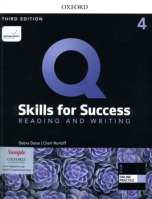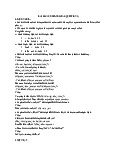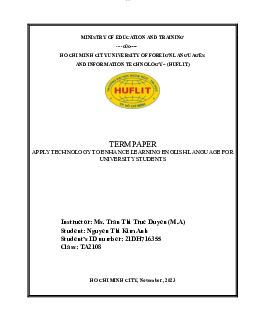




Preview text:
lOMoAR cPSD| 36006831 TO + V 1. Direction/destination –
Do you usually to take the bus to work?
If you are feeling sick, you should talk to see a doctor. Can you quickly run to the shop?
2. Time/time between two points – It is a quarter to 10 pm
3. Preference – I prefer coffe to tea. Do you prefer coffe to tea?
4. Limit/end point – during the floor, the water came to my knee FOR + V-ING (NOUN) 1. Benefits
Exercing every day is good for your health Ginger
is great for your immune system! 2. Duration/period of time
I have lived in HCM city for 10 years
I have been studying English class for 5 years.
How long have you been studying medicine for?
I have been living in HCM city for 5 years already.
I have been waiting for twenty minutes already. Where are you? 3. Helping someone
Can you lift it up for me, please ?
I need to collect emails for my mum. 4. Function/use For + V-ing
It is used for taking pics underwater. Note: to & for Reason/motive
Use To when the reason or motive is a verb.
Use For when the reason or motive is a noun. ¥ Why is he stuyding Engish?
¥ He is stuyding English to apply for a job.
¥ He is studying E for work.
¥ My assistant brought lunch to me.
¥ My boss brought lunch for me.
¥ I made a quick phone call to my mum.
¥ I made a quick phone call for my mum. lOMoAR cPSD| 36006831
COMMON COLLOCATION - /ˌkɒləˈkeɪʃn/ a combination of words in a language that happens
very often and more frequently than would happen by chance
Have you heard the collocation before?
It means when words are often together, they sound right, they sound natural.
1. Appologise + for (sth) (the action)
He is calling to apologise for missing the meeting yesterday.
2. Apologise + to (SO) (the person receiving the apology)
He should apologise to his boss for missing the meeting yesterday.
3. Travel to + somewhere
I travel to Cuba for the holidays.
Have you ever travelled to Europe?
4. Travel for + purpose/time I am travelling for three weeks I’m travelling for work. 5. Apply + for
I’m applying for a new job. I apply my CV to my boss. 6. Ask + for (STH)
You can ask for help you can not finish your exercises.
7. belong to (SO/a group)
That car that I smashed belongs to my Dad’s company. I belong to you.
8. Care + for (something/someone)
I have taken time off work to care for my mum after her operation. 9. Prepare + for
I need to prepare for my exam tomorrow.
Can you help me to prepare for dinner tonight. There are a lot of ppl coming around. 10. Wait + for
I have been waiting for the bus forever. Can you please wait for me? 11. Wait + to
We can wait to buy new clothes. lOMoAR cPSD| 36006831 lOMoAR cPSD| 36006831 /ˌfreɪzl ˈvɜːb/
a verb combined with an adverb or a preposition, or sometimes both, to give a new
meaning, for example go in for, win over and see to lOMoAR cPSD| 36006831
/ˈɪdiəm/[countable] a group of words whose meaning is different from the meanings of the individual words



